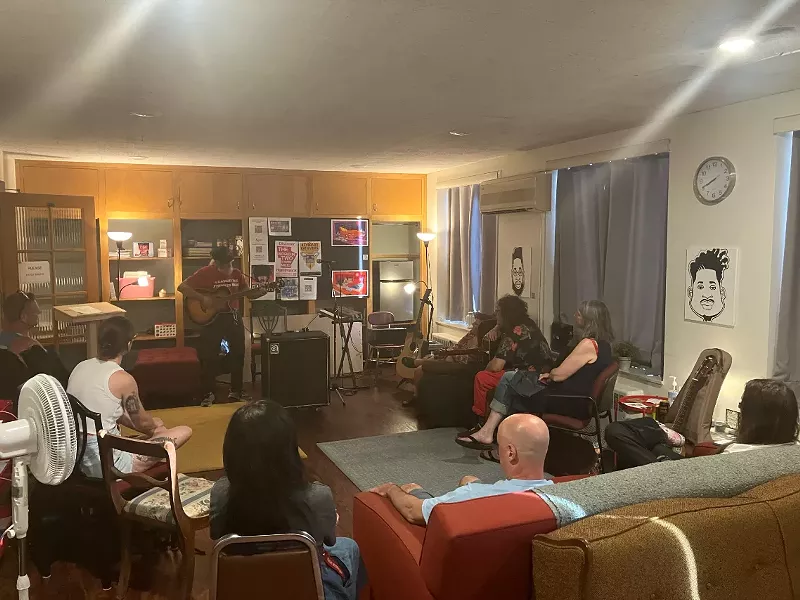When Christopher Tait first entered recovery for drugs and alcohol, creating and experiencing music and art made the journey feel like a reward rather than a punishment.
For him, creativity became an essential avenue for growth and enrichment.
When the local musician and Electric Six band member was first getting sober in 2011, he says finding help in the Midwest was extra difficult. For touring artists especially, the drives are long, the free time is minimal, and finding places for support is few and far between.
So, in 2016, he founded Passenger Recovery, a nonprofit organization with the mission of helping touring artists in recovery stay sober.
“There was a point in 2013 where I was on tour… There was nowhere to go for coffee. There weren’t any support groups. I didn’t have service at the time. My two options were to sit in the bar or I could sit in a freezing cold van in the middle of winter, so the inception came from that,” Tait says. “We just started telling local promoters that we would take people to meetings, or take them to coffee or to go do laundry or anything if they were trying to stay sober.”
Since then, the initial vision for Passenger has significantly expanded.
The organization created an online meeting-finder for touring musicians called Passenger Compass, which includes over 30,000 support groups in the United States and United Kingdom.
In 2022, the nonprofit was accredited by Faces and Voices of Recovery as a Recovery Community Organization (RCO), serving as a community anchor for people seeking recovery or transitioning from treatment.
“We were originally running this out of our house,” Tait says. “We would have people come stay on the futons or hang out in the backyard if they just needed to get out of the bar venue atmosphere, and then when we started doing advocacy events which transitioned into what we have now.”
With support from the Michigan Department of Health and Human Services, Passenger opened a physical space in Hamtramck in early 2024.
The location, situated between music venues in Detroit and Ferndale, is a full-circle moment for Tait, who played his first show in Hamtramck with his high school band in the mid-’90s.
Hamtramck, once thought to have the most bars per capita than any other U.S. city, used to be limited in recovery support. Now, Passenger offers eight weekly support groups, as well as music and art advocacy events, recovery coaching, translation services, and more.
“We just have a lot more freedom to do different types of more exciting programming, and beyond doing advocacy events in the community, we actually have a place now where we can provide enrichment,” Tait says. “If people are interested in recovery but they don’t want to go to a specific type of group, we can point them in a different direction or we can give them information or they can hang out there.”
He adds, “It’s really an attempt to normalize recovery in people’s everyday life. Instead of you going to treatment or you go to a support group and then you’re back out in everyday life, what if everyday life is something that’s motivational and positive overall and there’s someplace that you can go where you can feel safe to do that, to just exist as somebody who’s interested in making a change?”
At Passenger’s space, one half is dedicated to recovery resources, while the other focuses on the arts, featuring rock biographies, instruments, and board games. Visitors can attend a 12-step meeting one day and an open mic or yoga class the next — in a space covered in local and global art, much of which is made by recovering artists. Passenger also collaborates with organizations like MusiCares and the Phoenix to extend its reach into the broader metro Detroit community.
“If I’m in recovery, I can’t assume that the world is going to shape itself around my changes, and so I think it’s really important to still have books about the struggles and the demons and the reality of being somebody in the music industry, so that we can learn from it,” Tait says. “Our goal was to try and make it as well rounded as possible, and I really feel like people have felt comfortable. We’ve gotten a great reaction from it.”

Courtesy photo
Passenger Recovery recently hosted a Ukrainian music event. Director Christopher Tait is pictured on the far right.
Cultural representation is also important to Passenger, especially in Hamtramck, sometimes called “the world in two square miles.”
“If we’re looking to assist people with well-being beyond just recovery from drugs and alcohol, we have to listen to the community,” Tait says.
Recently, Passenger hosted a Ukrainian music event and a hip-hop mental health panel. Plus, the organization met with Hamtramck’s new Chief of Police, Jamiel Altaheri, to discuss SUD (Substance Use Disorder) support for the Muslim community.
Passenger also does outreach in local food banks and schools, partnering with the Detroit Friendship House and connecting with the Hamtramck Drug Free Community Coalition to introduce SUD education through music programs in schools. The nonprofit also runs a virtual youth series called “If You Can See It, You Can Be It,” where music professionals discuss recovery and health in the entertainment industry, helping underserved youth who envision creative careers make positive decisions.
“When I was first in recovery, I knew I needed to make changes,” Tait says. “Music has been such a positive force in my life, and I know it’s beneficial for people to find ways to express themselves.”
He adds, “I can’t imagine life without music and the arts. They’ve made everything in my life more vibrant.”
More information on Passenger Recovery’s team and upcoming events is available online at passengerrecovery.com and on Instagram @passengerrecovery.

